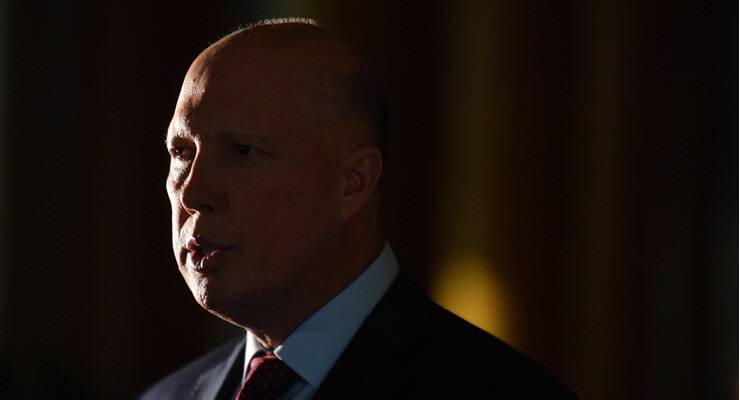
Applications by US and other foreign intelligence agencies to wiretap Australian citizens will be signed off by former Coalition MPs and staffers under a draconian Peter Dutton bill currently being examined by parliament.
The Telecommunications Legislation Amendment (International Production Orders) Bill 2020 was introduced by Dutton in March and is currently being examined by the joint standing committee on intelligence and security.
The bill will enable Australian and foreign governments to agree to arrangements for collecting information on each others’ citizens via electronic surveillance.
The US Clarifying Lawful Overseas Use of Data Act (or CLOUD Act) currently gives US intelligence and law enforcement agencies the power to demand US companies provide surveillance data no matter where in the world it is held, but also prevents other governments from directly requiring US firms to do the same. It also prevents other governments from barring US firms from sharing data with the US government.
Other governments whose agencies want surveillance data currently have to go through a “mutual legal assistance treaty” (MLAT) process that requires assessment by the US government and a US court order.
Australia has a similar process for MLATs orders here, though these currently do not allow telecommunications intercepts. Inter-governmental agreements will enable Australian and US agencies to directly obtain data from each others’ carriers, and the bill will expand the data that can be obtained to include telecommunications intercepts.
Under the International Production Orders Bill, ASIO may seek an order to surveil Australians on behalf of agencies of foreign governments who have an agreement with Australia. Initiating orders will require as little as a verbal approval by the Attorney-General.
Traditionally, law enforcement and intelligence-gathering warrants for surveillance of Australians are signed off by judicial officers. But orders sought under this legislation can be signed off by a member of the security division of the Administrative Appeals Tribunal (AAT).
The security division of the AAT has, even more than the AAT overall, been stacked by the Abbott, Turnbull and Morrison governments with failed Coalition MPs, former staffers and friends of the Coalition.
That means that, alarmingly, the bill would see former Tasmanian MP Andrew Nikolic, who lost his seat in 2016, signing off on requests for the National Security Agency and other foreign intelligence agencies.
The notoriously thin-skinned Nikolic, briefly head of the intelligence and security committee while in parliament, was appointed to the security division of the AAT in 2017 in one of the Turnbull government’s many gifts to MPs who lost their seats, and as part of the Coalition’s ongoing stacking of the AAT, investigated by Inq last year.
Nikolic holds hardline views on national security versus civil liberties. In 2015, he described civil liberties objections to extensions of national security laws as “impractical nonsense” and said debate about national security laws was a “luxury” Australia could no longer afford.
Nikolic isn’t the only Coalition figure who would be signing off on foreign agencies’ requests to spy on us.
Former Coalition staffers Don Morris and Tony Barry, former Queensland National Party Attorney-General Paul Clauson, former Alexander Downer staffer Phoebe Dunn, an array of former state Liberal MPs, LNP “law and order” adviser Dominic Katter, former Christian Porter staffer William Frost, Howard-era Liberal MP De-Anne “regional rorts” Kelly, and former Liberal senate president Stephen Parry are just some of the Coalition’s appointees who work in the security division.
The presence of former members, staffers and allies of the government obliterates the idea of separation between the executive arm of government applying to infringe the liberties of its citizens, and judicial arm which is supposed to safeguard them.
Moreover, the intelligence and security committee has been told by the Commonwealth Ombudsman, which is required by Dutton’s bill to inspect and report on the operation of the scheme, that it has yet to be told whether it will be given the necessary resources to do so.
“If the bill is passed without appropriate funding, my office will not be able to undertake the activities necessary to assure Parliament these new powers are being used appropriately,” Ombudsman Michael Manthorpe told the committee in a submission, noting that the government had only committed to discussing funding in the next budget in October.
Dutton’s bill is part of a wider push by him to again expand surveillance powers and curb civil liberties.
Under a new bill to expand the ASIO Act introduced this week, ASIO will be allowed to detain and question 14 year olds, block lawyers from representing clients, prevent detainees from even contacting lawyers, and even throw legal representatives out of interrogations if they do anything “unduly disruptive”, which includes doing anything other than asking for clarification of questions or providing legal advice to detainees.
The bill is subject to a quick inquiry by the intelligence committee that is to report by 26 June. Another hearing is underway this morning in Canberra.
It seems that, under the cover of a pandemic, Dutton is trying yet another attack on civil liberties.
What do you think of Peter Dutton’s push to expand surveillance powers? Let us know your thoughts by writing to letters@crikey.com.au. Please include your full name to be considered for publication in Crikey’s Your Say column.








Crikey is committed to hosting lively discussions. Help us keep the conversation useful, interesting and welcoming. We aim to publish comments quickly in the interest of promoting robust conversation, but we’re a small team and we deploy filters to protect against legal risk. Occasionally your comment may be held up while we review, but we’re working as fast as we can to keep the conversation rolling.
The Crikey comment section is members-only content. Please subscribe to leave a comment.
The Crikey comment section is members-only content. Please login to leave a comment.